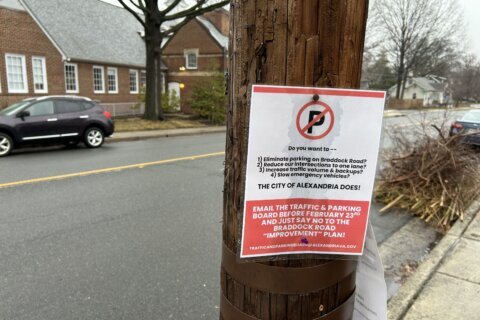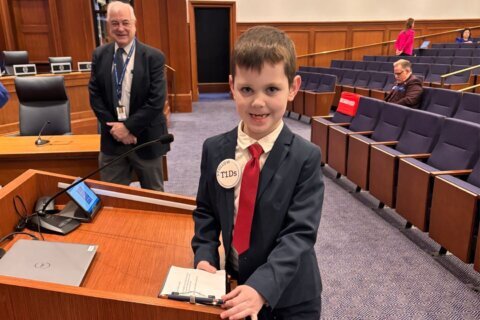This article was republished with permission from WTOP’s news partner InsideNoVa.com. Sign up for InsideNoVa.com’s free email subscription today.
This article was written by WTOP’s news partner InsideNoVa.com and republished with permission. Sign up for InsideNoVa.com’s free email subscription today.
A petition to mandate COVID-19 vaccines for school employees and all eligible students failed this week when the Virginia Department of Health opted to take no action on the request.
In a decision posted Monday, the agency stated that it lacked the “clear statutory authority” to mandate the shots for employees. Under state law, the department does have the ability to add new vaccine requirements for students, but pointed out that federal health agencies have yet to add the COVID-19 vaccine to its childhood immunization schedule.
“While recommended, it’s not yet been formally added,” Dr. Laurie Forlano, VDH’s deputy commissioner for population health, said in a phone call on Monday. “And that’s the big reason for our decision.”
Barring federal action, the failed petition likely marks an end to efforts to require the vaccine in Virginia schools. Governor-elect Glenn Youngkin has publicly opposed mandating the shots, even while calling on Virginians to get vaccinated. The same views are largely held by the state’s Republican lawmakers, who now hold a majority in the House of Delegates.
But amid ongoing national debates over vaccine mandates, the public petition was a largely unprecedented way for concerned parents to make their case. Historically, the General Assembly has updated Virginia’s school vaccination requirements through legislation. A 2020 bill, though, added new immunizations to the schedule and included language allowing the state Board of Health to fast-track changes or additions.
State law also requires agencies to consider any public petition for regulatory action, according to Joseph Hilbert, VDH’s deputy commissioner for governmental and regulatory affairs. Combined with the agency’s recently expanded authority, the process opens up the possibility of amending school vaccine requirements through regulatory action rather than through legislation.
The petition, filed in September, specifically called on the state Department of Health to mandate vaccines for school employees and eligible students, who now include all children aged 5 and older. The petitioner, listed online as Kristen Calleja, also asked the state to allow only medical exemptions to the regulation.
“My daughter and all other students should have a right to be able to attend school without being unnecessarily put at risk by other students and teachers who refuse to be vaccinated,” Calleja wrote, adding that “the irrational minority should not be dictating the public health policy for Virginia or the schools.”
The petition broke records for VDH’s typically sleepy regulatory process, accumulating 11,718 unique comments online. The vast majority — nearly 95 percent, according to the agency — were against a potential mandate, with more than 6,000 Virginians urging the department to keep school vaccines voluntary. But more than 600 residents supported requiring the shots for both students and school employees.
The department lacks the authority to remove religious exemptions to required school immunizations, it pointed out in its decision. While pediatric cases of COVID-19 have been a growing concern since the fall, when the rise of the delta variant led to a sharp spike in cases, the success of school-based mandates have been mixed. The city of Richmond recently backtracked on a decision to take disciplinary action against school employees who refused the vaccine, concerned that it could exacerbate vacancies across the division.
Currently, COVID-19 and the flu are the only diseases with vaccinations recommended by the U.S. Centers for Disease Control and Prevention but not required for school attendance in Virginia. Forlano said the flu vaccine largely isn’t required for logistical reasons, including the fact that the formulation changes every year and often isn’t released until after the start of the school year.
“For something like measles, you get the series when you’re a small child and that’s that,” she said. “It’s not an ongoing thing, which can become pretty administratively and financially complicated for school districts.”
While the same isn’t currently true for the COVID-19 vaccine, there’s potential that the same logistical hurdles could emerge. Several vaccine manufacturers have introduced plans for yearly boosters, even though it’s not clear whether they’ll be necessary (even with some degree of waning immunity against individual infection, data suggests the shots remain highly effective against hospitalization and death.)
“It’s hard to say,” Forlano said. “There could likely be some similarities between the two vaccines, but no one knows for sure.”







